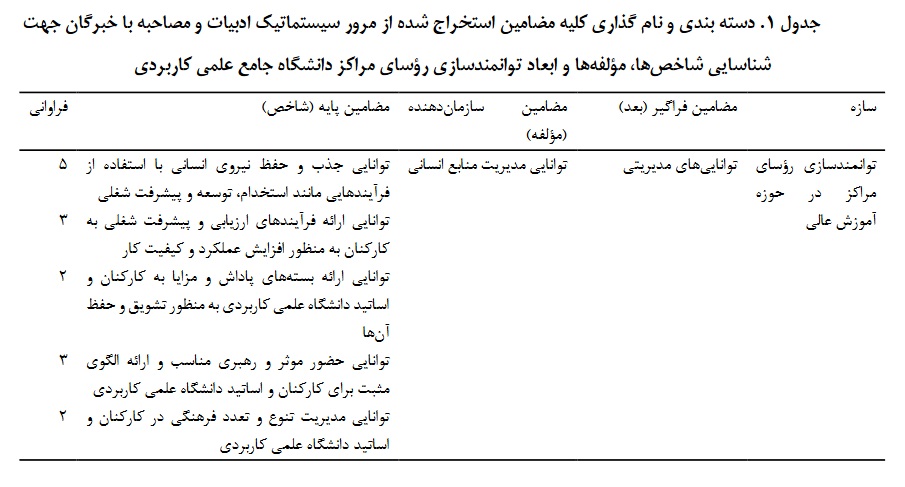شناسایی شاخصها، مؤلفهها و ابعاد توانمندسازی رؤسای مراکز دانشگاه جامع علمی کاربردی
کلمات کلیدی:
تواناییهای مدیریتی, تواناییهای فردی, بهبود کیفیت آموزشیچکیده
پژوهش حاضر با هدف شناسایی شاخص ها، مولفهها و ابعاد توانمندسازی روسای مراکز دانشگاه جامع علمی کاربردی انجام شد. این پژوهش به لحاظ هدف، کاربردی و همچنین، به لحاظ نوع داده، فراترکیب و تحلیل محتوا متون مصاحبه بود. جامعة مورد مطالعه شامل مبانی نظری و پیشینه مرتبط پایگاه¬های داده داخلی (1391-1401) و خارجی (2013-2023) و همچنین خبرگان و متخصصان دانشگاه جامع علمی کاربردی بود. حجم نمونه حذف سیستماتیک بر اساس نمودار جریان مدل پریزما و روش نمونه¬گیری هدفمند و قسمت تحلیل محتوا 13 مصاحبه شونده بر اساس اصل اشباع و روش نمونه¬گیری هدفمند بود. ابزارگردآوری داده¬ها اسناد کتابخانه¬ای و مصاحبه نیمه ساختار یافته با خبرگان بود. به منظور محاسبه روایی چک لیست 27 موردی بر اساس مدل پریزما و برای محاسبه پایایی روش ضریب کاپای کوهن برای بخش فراترکیب و همچنین روایی محتوا و پایایی بازآزمون و توافق بین دو کدگذار استفاده شد. روش تجزیه و تحلیل داده¬ها تحلیل مضمون (مضامین پایه، فراگیر و سازمان دهنده) با نرم افزار Maxqda2020 بود. یافته¬ها نشان داد ابعاد توانمندسازی رؤسای مراکز در حوزه آموزش عالی شامل تواناییهای مدیریتی (با مؤلفههای توانایی مدیریت منابع انسانی شامل 5 شاخص، توانایی مدیریت مالی شامل 5 شاخص، توانایی مدیریت تحقیقات و توسعه شامل 4 شاخص و توانایی مدیریت فناوری اطلاعات شامل 4 شاخص)، تواناییهای ارتباطی (با مؤلفههای توانایی شنیدین فعال شامل 6 شاخص، توانایی بیان خوب شامل 5 شاخص، توانایی برقراری ارتباط با دیگران شامل 4 شاخص، توانایی استفاده از روشهای ارتباطی مختلف شامل 5 شاخص و توانایی مذاکره و حل اختلاف شامل 4 شاخص)، تواناییهای حرفهای (با مؤلفههای توانایی تسلط بر دانش و فناوریهای روز شامل 5 شاخص، توانایی برنامهریزی و مدیریت دورههای آموزشی شامل شامل 4 شاخص، توانایی توسعه روابط با صنعت شامل 4 شاخص، توانایی ارتقای فرهنگ سازمانی شامل 5 شاخص و توانایی مدیریت تحولات شامل 5 شاخص)، تواناییهای فردی (با مؤلفههای توانایی ارتباطی شامل 4 شاخص، توانایی فنی شامل 5 شاخص، توانایی رهبری شامل 5 شاخص و توانایی آموزشی شامل 6 شاخص) میباشد.
دانلودها
مراجع
Rashidi Z. Scholarship of Teaching, missing Function of higher education in Iran; Reflection of Bullying. 2020.
Habibi A, Beheshti Far M, Kazemi H. Identification and Qualitative Analysis of Challenges in Higher Education in
Iran. Iranian Political Sociology. 2022;5(11):6346-68.
Sherick HM. The thoughtful development of others: A qualitative study of the impact of developmental relationships
on chief academic officers in higher education2014.
Hemmati MA, Qasemzadeh A. The Role of Knowledge Creation and Its Dimensions in Management Skills of
Managers of Tabriz University of Medical Sciences. Depiction of Health. 2016;6(3):16-23.
Sprafke N, editor Dynamic capabilities and job design: Applying employee empowerment to organizational renewal.
EGOS Colloquium conference; 2013; Edinburgh, UK.
Haile A. Leadership Styles at Haramaya University and Implications for Corporate Success. East African Journal of
Sciences. 2017;11(1):51-8.
Yamani Dozi Sorkhabi M. Examining the state of development planning of public universities in Iran. Quarterly
Journal of the Iranian Higher Education Association. 2009;4(1):1-19.
Ngai EW, Chau DC, Chan T. Information technology, operational, and management competencies for supply chain
agility: Findings from case studies. The Journal of Strategic Information Systems. 2011;20(3):232-49. doi:
1016/j.jsis.2010.11.002.
Kurzhals K. Resource recombination in firms from a dynamic capability perspective: Coventry University and
Münster University; 2015.
Torkzadeh JM, Salimi M, Forough QB. Academic Empowerment with a Strategic Approach: a Situational Framework
for Planning the Development of Bamiyan University, Afghanistan. Quarterly Journal of Educational Planning Studies.
;6(11):133-57.
Elgamel M. Dynamic organizational capabilities: the joint effect of agility, resilience and empowerment. Journal of
Human Resource Management. 2018;6(2):44-9. doi: 10.11648/j.jhrm.20180602.11.
Abdollahi B, Nohe Ibrahim M. Employee Empowerment: The Golden Key of Human Resources Management.
Tehran: Virayesh Publications; 2007.
Salari S, Abedini M. Examining the role of management succession planning (MSP) in talent identification and
empowerment of human capital in Hormozgan University of Medical Sciences. Hormozgan Medical Journal. 2017;21(2):119-
doi: 10.29252/hmj.21.2.119.
Mirzamahdi MH, Mohammadi H. A Reflection on the Anthropological Foundations of "Quality Assessment" in
Iranian Higher Education and Its Alignment with Islamic Anthropology. Journal of Measurement and Educational Evaluation
Studies. 2020;32:167-202.
Marks TA, Jorns BA. Challenges with the self-consistent implementation of closure models for anomalous electron
transport in fluid simulations of Hall thrusters. Plasma Sources Science and Technology. 2023;32(4):045016. doi:
1088/1361-6595/accd18.
Akter KM, Tang SM, Adnan Z. Impact of empowerment and ICT on quality of work life: The mediating effect of
trust climate. Cogent Business & Management. 2023;10(1). doi: 10.1080/23311975.2023.2176412.
Dhanabhakyam M, Rekha R. An empirical study on employee empowerment in banks during demonetization period
with reference to select banks in Coimbatore District. International Journal of Advanced Educational Research. 2017;6:281-4.
Duan Y, Chen Y, Liu S, Wong CS, Yang M, Mu C. The moderating effect of leadership empowerment on relational
capital and firms' innovation performance in the entrepreneurial ecosystem: Evidence from China. Journal of Intellectual
Capital. 2023;24(1):306-36. doi: 10.1108/JIC-07-2021-0183.
Türkmendağ Z, Tuna M. Empowering leadership and knowledge management: the mediating role of followers'
technology use. Journal of Organizational Change Management. 2022;35(2):330-47. doi: 10.1108/JOCM-11-2020-0364.
Kang MM, Park S, Sorensen LC. Empowering the frontline: internal and external organizational antecedents of teacher
empowerment. Public Management Review. 2022;24(11):1705-26. doi: 10.1080/14719037.2021.1919185.
Kumar N, Liu Z, Jin Y. Evaluation of employee empowerment on taking charge behaviour: an application of perceived
organizational support as a moderator. Psychology Research and Behavior Management. 2022:1055-66. doi:
2147/PRBM.S355326.
Aldaihani SG. Administrative empowerment among Kuwait University staff and its effect on their job satisfaction.
Journal of Applied Research in Higher Education. 2020;12(2):210-29. doi: 10.1108/JARHE-02-2019-0027.
Ekowati VM, Sabran S, Supriyanto AS, Pratiwi VU, Masyhuri M. Assessing the impact of empowerment on achieving
employee performance mediating role of information communication technology. Quality-Access to Success.
;22(184):211-6. doi: 10.47750/QAS/22.184.27.

دانلود
چاپ شده
ارسال
بازنگری
پذیرش
شماره
نوع مقاله
مجوز
حق نشر 2024 نشریه پژوهش و نوآوری در تربیت و توسعه

این پروژه تحت مجوز بین المللی Creative Commons Attribution-NonCommercial 4.0 می باشد.










